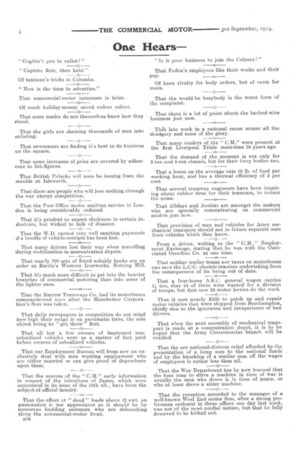One Hears— " Oughtn't you to enlist?"
Page 4

If you've noticed an error in this article please click here to report it so we can fix it.
" Capture first, then hold."
Of taxinaen's tricks in Colombo.
" Now is the time to advertise."
That commercial-motor insurance is brisk.
Of ranch holiday-money saved nolens volens.
That some trades do not themselves know how they stand.
That the girls are shaming thousands of men into enlisting.
That newcomers are finding it's best to do business on the square.
That some increases of price are covered by adherence to list:figures.
That British Polacks will soon be issuing from the moulds at Isleworth.
That there are people who will lose nothing through the war except competition.
That the Post Office motor mailvan service in London is being considerably reduced.
That it's prudent to expect slackness in certain industries, but wicked to talk of disaster.
That the W.D. cannot very well sanction payments if a bundle of vehicle-receipts has been lost.
That many drivers lost their way when travelling during mobilization to concentration depots.
That nearly 700 sets of fitted subsidy hooks are on order at Bartle's Western Ironworks, Notting Hill.
That it's much more difficult to get into the heavier branches of commercial motoring than into some of the lighter ones.
That the Barrow Tramways Co. had its motorbuses commandeered soon after the Manchester Corporation's fleet was taken.
That daily newspapers in competition do not mind how high their outgo is on pneumatic tires, the sole object being to "get there" first.
That all but a few owners of impressed non. subsidized vehieles were as a matter of fact paid before owners of subsidized vehicles.
That our Employment Bureau will from now on exclusively deal with men wanting employment who are either married or can give proof of dependents upon them.
That the sources of the "C.M." early information in respect of the intentions of Japan, which were announced in its issue of the 13th ult., have been the subjected official inquiry.
That theeffect ot " dead " loads above 12 cwt, on pneumatics', is not appreciated as it should be by numerous budding salesmen who are debouching along the commercial-motor front. "Is it your business to join the Colours?"
That Eoden's employees like their works and .their pay.
Of keen rivalry for body orders, but of roam for more.
That the would-be busybody is the worst form of the complaint.
That there is a lot of point about the barbed-wire business jnst now.
Thit late work in a national cause means all the drudgery and none of the glory.
That many readers of the " CM." were present at the first Liverpool Trials morethan 16 years ago.
That the demand of the moment is not only for 3-ton and 5-ton chassis, but for their lorry bodies too.
That a horse on the average eats 10 lb. of food per working hour, and has a thermal efficiency of 2 per cent.
That several tramway engineers have been inquiring about rubber tires for their tramcars, to reduce the noise.
That Alldays and Austins are amongst the makers who are specially concentrating on. commercial models just now.
That pre:vision of men, and vehicles for Army mechanical transport should not in future separate men from vehicles which they know.
From a driver, writing to the " C.M.," Employment Exchange, stating that he was with the Ossociated Omnibus Co. at one time.
That neither trailer trains nor taxes on motorbuses can save the L.C.C. electric-traction undertaking from the consequences of its being out of date.
That a four-horse A.S.C. general wagon carries il ton, that 54 of them were wanted for a division of troops, but that now 24 motor lorries do the work That it cost nearly 2800 to patch up and repair motor vehicles that were shipped from Southampton, chiefly due to the ignorance and inexperience of bad drivers.
That when the next assembly of mechanical transport is made at a concentration depot, it is to be hoped that the Army Commissariat branch will be notified.
That the net national-distress relief afforded by the presentation of a lump sum to the national funds and by the knocking of a similar sum off the wages of employees is rather less than nil.
That the War Department has by now learned that the bet man to drive a machine in time of war is usually the man who drove it in time of peace, or who at least drove a sister machine.
That the reception accorded to the manager of a well-known West End motor firm, after a strong proGerman outburst in these offices one day last week, was not of the most cordial nature, but that he fully deserved to be kicked out.


















